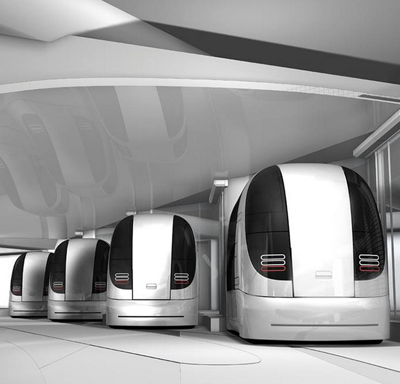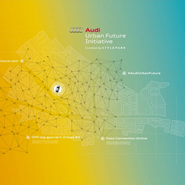German Automaker Audi is continuing to grapple with pressing global issues through its Urban Future Initiative Award 2014 that commenced Jan. 6, the evening before the opening of the International CES in Las Vegas.
Fans voted until Jan. 5 between three speed pitches by United States teams vying to take part in this year's urban future initiative. Philip Parsons, urban planner and founder of Sasaki Strategies, and Federico Parolotto, mobility expert and principal of Mobility in Chain received the most votes for their "New online marketplace for mobility" proposal and will be given the opportunity to flesh out their ideas until October.
"All three had very good ideas and did an excellent job in the speed pitch to explain their vision and how they would like to work it in the competition in 2014," said Larissa Braun, director of CEO communications at Volkswagen Group China, Beijing.
"The topic of intermodality is a big topic especially in the United States where you have a long history of commuting and public transport is not meeting so far all those needs," she said. "So we think people are very much interested in how all mobility providers in the city could intelligently embed their form of mobility into the cities, including public transport, cars and other means of mobility.
"Also we know that having a choice according to your needs makes mobility more fun and if with the help of data such a platform could be created, people would very much appreciate this."
Fixing the future
Mr. Parsons and Mr. Parolotto envision an optimized Boston where citizens can seamlessly survey transportation options for the most suitable option, based on cost, time, comfort or sustainability.

Self-driving capsules from The Audi Initiative
According to their proposal, "The places for changing between the bus, train, car and future means of transport will become new urban hubs, with a new kind of cultural energy, affecting our work, our social life, our education and entertainment." In other words, citizens will be able to know how well and where transportation options are traveling to make informed decisions.
Their idea allows entrepreneurs to swiftly tap into the digital and physical infrastructure to offer new options that mesh with existing options.
Congestion and being late will be a thing of the past, according to the proposal, when all modes of transportation are communicating with one another, as opposed to the current prevailing model of fragmentation.
Speed pitch by Mr. Parsons and Mr. Parolotto
Mr. Parsons and Mr. Parolotto earned 41.56 percent of the votes from fans.
The runner-up proposal was submitted by Axel Kilian, computational designer and assistant professor at Princeton University, Ben Fry, founder and principal, Fathom Information Design and Saul Griffith, inventor and founder of Otherlab.
"The flexible relationship between the city and mobility proposal sought to use data modeling to create flexible mobility solutions such as pliable parking lots.
Speed pitch by Mr. Kilian, Mr. Fry and Mr. Griffith
Kevin Slavin, assistant professor and founder, Playful Systems group at MIT Media Lab and Eric Rodenbeck, founder and CEO, Stamen Design submitted the third place proposal titled "The human love of play reveals mobility needs."
This proposal was inspired by the notion that "humans are moved not by efficiency and optimization, but by desire and delight." To find the right balance between internal human drives, the team would "use sensors from smartphones, cars, urban infrastructure – wherever they can find them – to reveal patterns of movement and behavior."
Speed pitch by Mr. Slavin and Mr. Rodenbeck
The other participants in the initiative will be selected by Audi from around the world and the results will be published in October. More information can be found here.
Envisioning the future
German automaker Audi is enlisting 12 United States undergraduates for a six-week practicum in the summer of 2014 to investigate how mobility will evolve in the coming decades.
Major cities around the world are experiencing increasing population density that place a strain on public and private resources, especially transportation. The U.S. undergraduates will explore ideas that address how automobiles will adapt to the stressed infrastructure and shifting availability of resources (see story).
The 2014 Urban Future Initiative departs from earlier initiatives in terms of its scope.
"This has only been the start," Ms. Braun said. "Now the team will work more in depth on their proposal for a concrete urban context and then enter their proposal in the competition 2014.
Final take
Joe McCarthy, editorial assistant on Luxury Daily, New York
{"ct":"y21RSvAEv30EFBPHqbqVgyNi8dFxLsiRn092hB+5bjEfaFlfclvcoGuN75\/6THvV1so\/T\/7S7wzULLWhXfI9l\/el19Qi\/pRvSw9zH\/u4T8jiLtpvYf7efoB6unL7yJi8dD4Szspx7IDYNL2H5vqeew6t5UGqNRoXZIgj8l3LqbQtXlr64rEA4owNw7Oi2EE8mx0wJFYBvNr3\/Ab0ojYozQ8kPd2y7red+oVMOXMiOnDQDd9F592t+B6J8FUJSMswkd3nDT7nBJSs8R0QgNUpEgmDZizuVomPyBC683wKvufh4PKiSeOT1VdcY\/TwV6OysdJiAuw4z+UIGmPKjdyUlWxfhSeFYijHvnlWklhnc2F\/3UsXJOWuuoZiTtTNIcCX\/LZf78JMuWGP7JnXPuytAebJl5d8kJAP3IVFrqhHM8CuaC7+y8tBu3\/5QJdCSEjJCypE8FhxhbMtVFe\/zu\/KLcoaAl\/kVNY+MFY15udjQ9UeG7FE3ThiZGNA7y062P1OqpwnuEkaLbACvXs2W5JPofvKPXLgVcFCoOuHNlYT4HpcdZKc1u\/w2KHulEOomIUcMhYdER0AT5IWynT3M77W\/NUlf5g+vWE0PkcN4OBo3A5tTZgVShm+WrgHnhvcEUKQysKBE\/P0WznRt3T5tHz8m1uEPL6T\/\/\/RDcdgHShWC8scIDYPOpP64oGHQ1Hufmqfa6A9cutqcuu2EfeQpTEHHwl2G4HX8KLYVaUEdnsK3UvdnDxlab5dZ1CpYqy4Ao1bvdPlcwTu1Do\/+raMtg35U4n\/T8uj+UbZuHfChsFN64OfG3FXNPo2PjMotciiW8IUr6B2mdX5QILqlXkq6ktstolYQHsOIcYF59wAwVJIHccfUq03wOEWgwdlWNhZ4LMefriTUj1nDsS8QaQsElZykefyzWrFkM\/VJZB\/O1Iu\/1N7GhGfEIiBvOWG2Bh\/4bfeZsZfiwbrl7NE0RSs5IfG5W2aRBoNvIz\/pEfSzJwQCD1f0YAGI5N8gq4+sj\/sLyrFqiOn83GeRWDzf7DMUr+R31RdRV4Mn8CBBP\/804XCMAZKMzhmK3Oz7nxxEjFxzuyaWXFg2WIlBbT\/MVQCtWXkYJg4Cfs\/mWWWLB4Jm88kq9FZ62pBXIiCa5XuvvMffk6eNfdg1Pljp4\/YIweYXI5vJg5P2wzAt6W2LHJwGZoKZxxvo\/aNxMuiez0a3C4bu85\/uHefchbSmEa5Qj6zfEcX12WX5mn9+r2bOF7Lkjvvl91hlGkHTYUdTFNrfl7FNA\/qfnBeQSj0TGK1zq8WT8ikhX4\/CtOKDnHXI58bdRKXWmL13Jz4rvyrZOTAUpYzu0MyAfBASBwu5lwFMj9U80revj9gqu+n+Bw26T6eZy0qLZovcJUhKsTf9frRqUGQp9VeNvyb4jjUvrrO1UZtisNfTw0L+Dvig8jKtL1BSkaFMOMb\/yikRNT27hVE5L2dlyBi+0DiQaG5ETubHkpBCwY3xQhcjcktN\/\/kALDBVCosDDIhzqqXkDcp5pS61Lbo2VU\/wgkzRhmdqMMjCmImB90FDjZA1S3\/wkC1Axc74V\/3RrpA+TTBr7slwkBum++pvVcv4kdGqwrR4WIfY0lRh4wCGyeDnf4LZvgsELCCt\/wzWC8ipqHYE+C9D0dXLXpUAf7zEQXB9kASZLE1Y1JD+Kag7WkRgvpd+NBygKLBVg7oqhXd31jszaxOtekkze652\/PtNdQ9rV7ykGC7O1kwImCnoihv9Ho1sP17bBIpyPNfejiwxWw34aYvh7YymU+66egkdyS8ivPPG\/HGyFXYVqyMMJDfsGN0IM\/zo1HVKuG2lDVV7Am+DVi940ZbMiHbn+S4SiEzBh22o\/nnJahrxwbNO6EMl5\/YdezCaBp+qQq50CqlZlEwJmPEqZEFSxwZdDe4n4t7Ux16IoEj0U3tFWQKOjULLk4tTmxhkcw52YHnanyG02cfCJEs7Jk3+9ViGlCwdslFQeH0xFISIt77YSt8JcQ\/6iuv6AnhBJh4YTKRckzPJLIwy4AsXgLSwXRfn2+HARMlccLNuYA7WtxR5PIVrpIAbPK2x\/vipdDyyGpQ1ibttmB1QvICNcnrwc1cHy2c+Ctg720\/kmQKKNeMYCI7LY1nzTW+J5nfzSoiB7nE5tyNuKgfCgJKgbsE5xADD\/gCqJIt2vDC9U43FbjK2aZBc\/aP1mqXbjon4aGCJI72EtPvYjh6ge3vEM8Vb\/O5uKwKcDB9CGfm6iP8IHPZrP8HYxE1S7nEAEISqlPM3AVHgYmQetLuG3hjNMO1WHzCtaAC3SSx81vdckR0k4RESMw3HHzhjekK6yHNzl7rDhAQvb4M5llmaqdoDt+KJNjPbUlQSZyOnFLYCVj1xp+a5XpTK2QaYKztBB7qbnSUasoSHpCHmSwwop+apy2jwbl1gXKwM\/RiYFmK61tvgqGdYbZ3m8hwrqgmrJYjijaCZbR9OMNOuHPlEKa\/v+3IRuCae+LeCKnlbfj8MJnUW4FzNVMs2gC\/TbIbwuW1cBIKuGs88SEyReE6aA7tSV8Umq9ViQZO3iyZWKNySdTqUqVLc50J8eLnOvBMnZyUC8q1Lg6H90DaCiY4dCWO6akhsuNj40Akn6fjepEjwfv9AUv2FOtObUkZVtoUwO2lcht8UxqoIXVxCsowiaZbHJKQ91Fts0XMA8mwi6dlcodQwrxNmWVsGFOLw6FvzTU+1PgqWzYR+wHyRtI98dXYrKQ6I5a+JLQBdlQwFwOlmNiyVRWec7iqIsacSJ1+Mo0PoHVbqscVCDf5m0xhvDGt8v31lczHHFOrIKCf84wuC4\/lzFLtm9iVIk4FnBxuhj2VCHEFi\/qn92kIH3mk5NNFxGZJkcQlfFnaOksylUoCeyj9b598qj2ci6Xqk+u7YXmQhTKPqFWb7u95Fd+N2uWFlJWdNmpRDbToWriOLHRJ43FTpXtjflXlYzUIZ3s7tgJzrNZA1Zo+nCcP163Sf\/PKpo9UfbM+hVMcqD9Nso11Gj02BN8nWIbpmbaXRMq2CFL10qTyWGXDpsiWTsKCjps0Yz64mRDRR9MiMpu32XeoJTAq4lLi1NsTm9Y97QHnYvDs+7b+6YGS4CKqe8SUrjGipkJN7eeK718Wm3naPGKZ\/1rADc4iq\/0\/DqDsjn6crfy7\/3pJ6Ysu7F2N6Ks8rhR9eF29OG0vrrhIUbZz5UvhEfV9pYjyIkOSaMH+z10g3Aec9dndlme39bZe2fngH6BsV\/uH204TsH8wCT\/wTyujhxHgcle0HgJgexkuK2ysRR48t3RSVRCkxg7tkDQ+8OBwgYFyOWrMCKmUXist\/CwT4gzyCRgQsXYgKX4+9c\/ljmRkzhH63wUMONNpK+yubxCT5QU+4BXY0INQqBXPOxfAlFfEGcARjfb9X6nk2pnLOs5q8bYNWeNgY4kf781DRfLejTRUOJY6fakUB1rxKFbZp2Ib+63HvO+xmKqVRKIPUgaLdUbdr5h+e+QLsdcD3H\/LF3o1ORHOD2hT3ZidqBwKioXplxQsQi5KCill70X+c0qCrnrNKs4q0zgQ7Gxj8+2RMNRnXLopv13c8ee1L95H0+82wo996ggm5rRKJJ5Vs6yZbLoT\/DM3QadZpaX9lqEwHdh+sX7jb1M1eNlfZkdtxrhCSdgC+EfYNe3yrNqq10MDboRVUXDPcYE2DqeqySBfMLtLL12iI43isK35LFOy6LVlDs1DjoVcXKA5k25rMtw0qngjotcmo9oiO0j2v3i2kJTkRN888rpgl1f\/+AOUZ08cd2kV4bK4+3nfJ6vZqgF+E5xRvV+vdrRiAaoXgLK5IYKj8UzHhLpJl4G7E3ioAtcp6FKuJ9\/GSINYKbgUy36+HrqNjl+bqy8bytsKL0xb\/NUFSbBQqEiptI0fWXqIC3660mqjYE6LmwNc0iagfJuj4vR6+i4JDDy93NtD1Fr9B2Jl6ucC2C+JD3GUgAaF7iez62yykC0oAwjXAIzVoaCE4J53GbqV2Ez\/66ho3Fr\/HjtEBoaM8T3GFwv3ipr3nU907UCRBQ4OgSfOgxivg+fmtK5T4BQ8GR+xXeUXvwgn45xhXx5agwVk3rj5IS\/dPZQUuzUP1WUQAzISCOq6Q3KX\/1eJyY61NrbQhuE2yAYShW69kQYCvCPnooX30BmKqHze3aj3RUIgojG9Kl4dpCQQBtxpt2KU0fTQ\/KAECwvQE+O4bY\/xZkjnjFUlvpB9rGOgsvCVvyCAUueKhc\/ySCEnEJD\/KqnEup\/2f3x+46tj7jeViF\/lQoox9WLOityKgKlYGBNjkZA28LfDZS240Ol5AT8zq3M0iGQaePyBBFBj4MdPMqS6HmUjnHbED4HPWGSnadzwmMz5G0w5nAsR8DPfhK1OH2a3dOBKXyB6RR2rdsJq2DTZG8DMy8YqPpx2EQKE\/MPylt0aWa9SgrMYO1oUOmTsqyQ9Fmx1C\/s+xbdUKAxqHwNKVqv8ojfbKnNUZWxGjBJg0sj2amyDibA8BNt4ztVps96Kj8no5P9\/n2mF0EkTHJ7uULUpZxbAt1vXkrC4819iDYM7GG8fpVlSRS95l6KIVl\/wMRi+9n+pd3Ii18bGmyCO7Dnx7B9IjxKd3rH2+urvLDRgP7saenYSkeb\/7mYI2ijDtezBRAP65ry1LhYelp46ZcKPvsvI0eygaosFsrNNSV0PqfXGy4418UN4fNXphBKGbWZDwj55cKQqrGIyncc8Uum6UEbEIE4mMP2k582fm94iPjmVno02f4y2jnOVNrz8m9FMTw+xPml5kGy7Jno6xTH\/zZXYbXHqgX7YBX207E0uhjp3KQBcOMdFAt+ojMt9\/81wwLmCH0PisaQD2JFQUpkbKrLYC1fzkw99Iw+ntwO\/WoRZUI9ne3rt1a4VKJB6cmuGYUmQ+nJLwLCIuWvpIAKcM8AzepYb55HMFgmHBGg6qdFIjfY6wtXvoZF67e1V9eBDm9sg6xOKZTqTCg87XmqsqItcU0TVFhn+sVtoxcYhn6m8R+FfNAlFLr6otpqoeJIggbN9qyg2gwQ8\/6RSHtK9B76f5gH9uD++tjZvPFc0Qf9Xo5L6Ggkm2N2Q5g6HsNS240eo\/Y8NyH4nSlN6n+YCqcsqVyWEDJNPBugCRToHdumVecjAINLCRDW7I4hfxi145pl9RX94pD\/nHXyQNPpkif2m8WMTV5fzWJ16H7zpdw7\/03sGFHJJ3wRG5Vyq4rM7BedmI2IV5YPoUy+ssnYp57jDhpyE6IpHcDI64wpKwVvRAg+R8jxxDsSlsOXxXoo0QfB2JfuOqD6xgUmcCF06ks7EETXjMzkS\/+VoA9BHFj5r63c\/Bgp1lxFu2uwtcu+nZcWaEt7c\/QI+6R+1fNGLy2ta8URRrRhpsHf0breA7VUbpDEC9T6TwqW3QKnFi5HQ4rqqgzzIBwpT\/t\/NJYsruLqrBfnX\/IqGIC1ixQDEpkcj30q++81fsQMhIkHNSFXNUvVaukWj8B9wFS7Kfqqkb4DMc9ONn1KUwpaSiOTSegUDrXu\/WRMGI6pWnO\/u\/cqP\/Qymh7j9+UwitdcoeALwaL2P6B6bzRwOtdsqDqW+so44T6KcTuXzkIHUIJTFvv8\/b50KF1lCnRtPSsUmZ\/JqML2hnG69vGq+8No6n\/V4C0UHLOOaq0LgAvocN8Qp8029Sa9Cyk0dN9MYOqHZ+T\/V9lKqK9Pn5GjZX\/Yp2y7mQdxIBd0qJmEo2L1L\/vD\/RIYYLxAcnUHdkw4g3cu7HZkChPODoCR8HTuMKtugg4cSfTI\/t68xpVJV9XMOFPL0SVoz2hSSaor02FcPfs7IXGKArleNt74o\/QQ+FQ0A3VjN2xxVPnoyamFSQTVlQ2XcIuDDjBzgiCWrdpp5MAuck\/8+z0TymlJKJTqYFZh4l3hK0TksUwdRphH0rMB05YBShY8dclxdFfVQbonq\/Y8ylBt2wnk33CmqhBEwAeotTBGtuqQ8EXzCF\/cgzUGk4ZhL1q4HuCjbWKrGROVZziTAQq2gggDEGE9aKqDUtes\/n3wDtnqgeQQ9MIu\/kiYzATof240XJmQPKH0r0xWQcpRSjB6+p0PLqMhhRmoNUIxvOR9E0B1M0sHRxtCTrt6j+AxkXYTF8zyhwhwLiBFEs0\/LB8\/X7GbbGTZ7XuGiLSSfpyrplUmgdQ9o2\/dlVCX+9zIk3JArIgyyG2scJRsY2XEV5Q6PRcdW0q6vxNWerLoTqoGfCd5TQ4DVsBy3rnubBti4Wqf0YcKCd7qt3WUxLtTeOcQH22Fv3b69mbNziIHw1XyYbOVcK6Hqejhmrco+ZfyTNNjUuBQFS6gHnbSecyDDjiFmdbwH76IQ3OhmVTAm7SuExsFZQjMJDy5Wn7Y68jJ8dqT3XIw1ZLCEosIp\/GiPEwIdfVXn07POzsfWcdu7Fit1lAd9l1JVkPmJU5fQv1xlBGB29eN8zS4xzBAaJQrKtx7\/5Ozn4dhL25MDajq33Fey2vDQPnzntBUjchfTVcyfm\/j+sXQfdEuJbF8MFn+lpPFELAVWRmnUSw6Xh3gS\/25Mbsrg0ZUBlzip2QcEZa6PSAmxPBb6RioWz3nj0IEtsO\/hpNWjEC3KU8BM+53DDWzhP\/l2oKcm9Jp6YgFAAv96CjpvkyjAbfCUYNtaIbjouDM4VatFdjR\/snMttyz2WzDtH9kkcYaPxIz5VEK+BEdRzJcb6d9dpTZbYX7aU9k8pHoSdX\/FPyxF0fL90dq3VpWCmZOXEVkOqdOL5SnyHTFNpVLbk4+z10rzOHX3F+UZI438G9MsHW3LqBDynFqs\/FHffkUDO\/2E9MD7ZrMVdZs+60iwPdX3oV0uC+nETqsEeQBCCIAhx0OPCO+rXsDEzBiSQiWvQxjeOE\/TUx2aqgPiXyxq8RsSCrjpkDQZqBexHTGEW3F+NguFE7VSaYmRsk7mgAiigo3mKQ9sg40LiWHzsLpn5c4JxAoEKCaOJgbdBQIFQ7u4seJeZpdTV5W\/8DyEWOO\/irL1qGeAmmW4T99r4yFj7sP\/hqgBrE\/yV+pyYcAbwoVN0J4zpZ5F1rfPAryoYj6Y37q8zUlbsEW7kis8Nv\/fL1\/BPIeD78e1KDfg6cX2AePuzc7UWcmp8f5oJ5JytkqBd0OUYPvKStxv87FgBj5D56Tg5FMYXqbQA\/7YmEJbSgb8iFfyGG94XCUKwX8P9jiehCxmYoF9fRdCpxEbg70BmJj9L7AuDq1iG1As3UZpwvwcREWlUi9nuWaew4NHt0MFjQu2lYJYVyLqwoO0U+aHCvHAq6ECMZ3RQYXUdr2\/uswSWqITZEWDuv52MKgJT\/Gm2ygZ4f+9tz2c51W1SOFm\/\/2CmVYNYWB2HFYpZh2CLx6bHubrrOyggzdaEEkHe7iJoQU2Ps3EhowVdqhRJgjVivcqkXlt8ibnluJ69KViv32jfPMr5ErOP+X7UiyvZVXBqSlhLBL\/tp+WuWw59L8ISuiMqOHMli49cekfnCX3RfGmz+5+1QNEjuEK6TNmVMdTutlpR\/z1klOxNqG\/Mqw4+4J3QKgAzc+ArR8ItbQiYO0+gdwomxBqtmXMhY2BO9TeP+zfD9yeAgSMlVHKlZhtWT2RRBMdfs56A3d0nMUzsO0nmyFIoQq9OkSH0Hy3LCSOiLdikBBlfFnG9+ovuJwud\/QLbMC8hOOLF0BTfYduVTdHJfWuud\/8D2FjKapg+kjqKz4O4vs\/2Sm\/+poNHlC+XArvk9n2FK1O9ErGAghCwC4bU0my1+3qwa9n1+vNrvIxnOtx4+lX1UD1TYrX4J61p4U\/ShpcQo4NT5P2EH7i6kKiD6Pv2+AL9sJK9DZEx\/WnUjr74E0SGO3z4RlImzENPIvetsaHFIQ3jnBEoaR1jiy\/tBbydznynzehI6SLABYYITPt6XRWUlb1hqeYw+u0aC7mT7RPxfVA40G3PKj6xyY278jda1t6HB290nYIW9b9lrNIr79q1eujj7NCpJiKhB\/WOhqNNDTSiqGj86PuDdGQqhF89RiT00etWixgeEG5MPx1mQm5JWXQDdVOIj6Nsc2TIXPiSGjI67uhIfARySbnqU8WZWysVE61b14XFyzCjTNlFj3yO5f8BdfhVzQguQzOxhCR0aUKZQM960j6LjuPMoIgs5DNiQ+ruPib+rWK39PA4R6BSYmsImJDuijzF84rj7xfeuKWx2RqlYVn2F20zMBIcKDxFQRQgrsgh+BTa7lFs7bw5kMd2uubySW4HY\/8v3PQ0chgmgT\/4uerDZ\/Fn1dkDiiKM94Uu2qo747UPMapibHW0Xf7bRs6vf4=","iv":"6892bfb71d38830478495a3f91a2955f","s":"4fb029d7210c6da0"}
